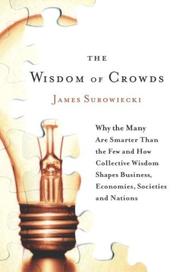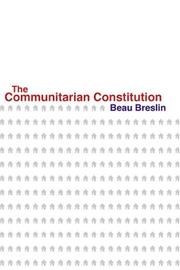| Listing 1 - 6 of 6 |
Sort by
|

ISBN: 0385503865 Year: 2004 Publisher: New York Random House
Abstract | Keywords | Export | Availability | Bookmark
 Loading...
Loading...Choose an application
- Reference Manager
- EndNote
- RefWorks (Direct export to RefWorks)
' No one in this world, so far as I know, has ever lost money by underestimating the intelligence of the great masses of the plain people.& & H. L. Mencken' H. L. Mencken was wrong. In this endlessly fascinating book, 'New Yorker' columnist James Surowiecki explores a deceptively simple idea that has profound implications: large groups of people are 'smarter' than an elite few, no matter how brilliant& better at solving problems, fostering innovation, coming to wise decisions, even predicting the future. This seemingly counterintuitive notion has endless and major ramifications for how businesses operate, how knowledge is advanced, how economies are (or should be) organized and how we live our daily lives. With seemingly boundless erudition and in delightfully clear prose, Surowiecki ranges across fields as diverse as popular culture, psychology, ant biology, economic behaviorism, artificial intelligence, military history and political theory to show just how this principle operates in the real world. Despite the sophistication of his arguments, Surowiecki presents them in a wonderfully entertaining manner. The examples he uses are all down-to-earth, surprising, and fun to ponder. Why is the line in which you're standing always the longest? Why is it that you can buy a screw anywhere in the world and it will fit a bolt bought ten-thousand miles away? Why is network television so awful? If you had to meet someone in Paris on a specific day but had no way of contacting them, when and where would you meet? Why are there traffic jams? What's the best way to win money on a game show? Why, when you walk into a convenience store at 2:00 A.M. to buy a quart of orange juice, is it there waiting for you? What do Hollywood mafia movies have to teach us about why corporations exist? 'The Wisdom of Crowds' is a brilliant but accessible biography of an idea, one with important lessons for how we live our lives, select our leaders, conduct our business, and think about our worl
Common good. --- Consensus (Social sciences). --- Group decision making. --- Common good --- Consensus (Social sciences) --- Group decision making --- 201 --- AA / International- internationaal --- 651 Maatschappij. Algemeen --- Collective decision making --- Decision-making, Group --- Decision making --- Authority --- General will --- Power (Social sciences) --- Good, Common --- Public good --- Political science --- Justice --- Public interest --- Sociologie: algemeenheden

ISBN: 0801892236 1435692187 9781435692183 9780801892233 0801877822 9780801877827 9780801885389 0801885388 Year: 2004 Publisher: Baltimore Johns Hopkins University Press
Abstract | Keywords | Export | Availability | Bookmark
 Loading...
Loading...Choose an application
- Reference Manager
- EndNote
- RefWorks (Direct export to RefWorks)
At a moment when American politicians and citizenry are struggling to balance competing needs, such as civil rights and homeland security, The Communitarian Constitution is vital reading for anyone interested in the evolving tensions between individual rights and the good of the community.
Constitutional law --- Common good. --- Public interest. --- Separation of powers. --- Good, Common --- Public good --- Political science --- Consensus (Social sciences) --- Justice --- Public interest --- State, The --- Common good --- Checks and balances (Separation of powers) --- Division of powers --- Powers, Separation of --- Separation of powers --- Delegation of powers --- Executive power --- Judicial independence --- Judicial power --- Judicial review --- Legislative power --- Philosophy. --- Law and legislation

ISBN: 0203987217 9780203987216 9780700717187 0700717188 9786610107421 6610107424 0700717188 9781135787523 1135787522 9781135787479 1135787476 9781135787516 1135787514 9781138983465 1138983462 1280107421 9781280107429 Year: 2004 Publisher: London New York RoutledgeCurzon
Abstract | Keywords | Export | Availability | Bookmark
 Loading...
Loading...Choose an application
- Reference Manager
- EndNote
- RefWorks (Direct export to RefWorks)
In this volume, a group of international scholars address issues relating to community wellbeing and the role of politics, law and economics in Europe and Japan in achieving human-centred symbiotic governance. Case-studies and suggestions for reform are presented in the arenas of economy, government administration, management, university governance, health, agriculture, the environment and urban planning.This book will prove a useful tool to those in business research institutes, members of administrative research institutes, NGO's and non-profit organizaions while also providing students
Common good. --- Bureaucracy. --- Political participation. --- Political planning. --- Planning in politics --- Public policy --- Planning --- Policy sciences --- Politics, Practical --- Public administration --- Citizen participation --- Community action --- Community involvement --- Community participation --- Involvement, Community --- Mass political behavior --- Participation, Citizen --- Participation, Community --- Participation, Political --- Political activity --- Political behavior --- Political rights --- Social participation --- Political activists --- Interorganizational relations --- Political science --- Organizational sociology --- Good, Common --- Public good --- Consensus (Social sciences) --- Justice --- Public interest

ISBN: 1589012410 143563893X 9781435638938 0878403493 9780878403493 9781589012417 Year: 2004 Publisher: Washington, D.C. Georgetown University Press
Abstract | Keywords | Export | Availability | Bookmark
 Loading...
Loading...Choose an application
- Reference Manager
- EndNote
- RefWorks (Direct export to RefWorks)
To dismiss the work of philosophers and theologians of the past because of their limited perceptions of the whole of humankind is tantamount to tossing the tot out with the tub water. Such is the case when feminist scholars of religion and ethics confront Thomas Aquinas, whose views of women can only be described as misogynistic. Rather than dispense with him, Susanne DeCrane seeks to engage Aquinas and reflect his otherwise compelling thought through the prism of feminist theology, hermeneutics, and ethics.Focusing on one of Aquinas's great intellectual contributions, the fundamental notion o
Feminism --- Women's health services --- Common good. --- Peace (Philosophy) --- Christian feminism --- Good, Common --- Public good --- Political science --- Consensus (Social sciences) --- Justice --- Public interest --- Philosophy --- Religious aspects --- Christianity. --- Thomas, --- Akʻvineli, Tʻoma, --- Akvinietis, Tomas, --- Akvinskiĭ, Foma, --- Aquinas, --- Aquinas, Thomas, --- Foma, --- Thomas Aquinas, --- Tʻoma, --- Toma, --- Tomas, --- Tomasu, --- Tomasu, Akwinasu, --- Tomasz, --- Tommaso, --- Tʻovma, --- Тома, Аквінський, --- תומאס, --- תומס, --- اكويني ، توما --- Ākvīnās, Tūmās, --- اكويني، توما, --- آکويناس، توماس, --- Common good --- Christianity
Book
ISBN: 2760619486 9791036501944 2760624218 2760629635 9782760624214 Year: 2004 Volume: 27/1 Publisher: Presses de l’Université de Montréal
Abstract | Keywords | Export | Availability | Bookmark
 Loading...
Loading...Choose an application
- Reference Manager
- EndNote
- RefWorks (Direct export to RefWorks)
Pourquoi un si grand nombre de Canadiens ne se sentent pas chez eux dans leur propre pays ? Certains de nos principaux problèmes et controverses politiques ne pourraient-ils pas trouver leur résolution dans une nouvelle forme de dialogue ? Ce sont les questions que développe ici le philosophe politique Charles Blattberg, qui affirme que la voie que nous devrions privilégier aujourd'hui en politique canadienne est la conversation. Selon lui, toutes les formes de dialogue auxquelles nous avons eu recours jusqu'à présent sont inadéquates et seule la conversation permettra des rapprochements réels en cas de conflit et pourra mener à une pleine réalisation du bien commun. Dans cet essai étonnant, Blattberg défend une nouvelle conception de ce qu'est ou devrait être un pays : une communauté de citoyens.
Communication in politics --- Common good. --- Communication politique --- Bien commun --- Canada --- Politics and government. --- Ethnic relations --- Political aspects. --- Politique et gouvernement --- Relations interethniques --- Aspect politique --- Bien commun. --- Good, Common --- Public good --- Political science --- Consensus (Social sciences) --- Justice --- Public interest --- Political communication --- Canada (Province) --- Province of Canada --- Dominion of Canada --- Ḳanadah --- Ḳanade --- Kanada (Dominion) --- Chanada --- كندا --- Канада --- Καναδάς --- Kanadas --- Republica de Canadá --- Dominio del Canadá --- Kanado --- کانادا --- Ceanada --- Yn Chanadey --- Chanadey --- 캐나다 --- Kʻaenada --- Kanakā --- קנדה --- カナダ --- Canadae --- Kanadaja --- 加拿大 --- קאנאדע --- Upper Canada --- Lower Canada --- Politique et gouvernement. --- Aspect politique. --- Special issues --- Littérature et société. --- Poesie --- Histoire et critique --- Jianada --- Kaineḍā --- dialogue social --- bien commun --- politique publique --- citoyenneté

ISBN: 0878403493 Year: 2004 Volume: *2 Publisher: Washington (D.C.) Georgetown University Press
Abstract | Keywords | Export | Availability | Bookmark
 Loading...
Loading...Choose an application
- Reference Manager
- EndNote
- RefWorks (Direct export to RefWorks)
To dismiss the work of philosophers and theologians of the past because of their limited perceptions of the whole of humankind is tantamount to tossing the tot out with the tub water. Such is the case when feminist scholars of religion and ethics confront Thomas Aquinas, whose views of women can only be described as misogynistic. Rather than dispense with him, Susanne DeCrane seeks to engage Aquinas and reflect his otherwise compelling thought through the prism of feminist theology, hermeneutics, and ethics. Focusing on one of Aquinas's great intellectual contributions, the fundamental notion of "the common good"-in short, the human will toward peace and justice- DeCrane demonstrates the currency of that notion through a contemporary social issue: women's health care in the United States and, specifically, black women and breast cancer. In her skillful re-engagement with Aquinas, DeCrane shows that certain aspects of religious traditions heretofore understood as oppressive to women and minority groups can actually be parsed, "retrieved," and used to rectify social ills. Aquinas, Feminism, and the Common Good is a bold and intellectually rigorous feminist retrieval of an important text by a Catholic scholar seeking to remain in the tradition, while demanding that the tradition live up to its emphasis on human equity and justice.
Algemeen welzijn --- Bien commun --- Bonum commune --- Common good --- Gemenebest --- Good [Common ] --- Paix (Philosophie) --- Peace (Philosophy) --- Vrede (Filosofie) --- feministische ethiek --- éthique féministe --- Thomas Aquinas --- Feminism --- Religious aspects --- Christianity --- Women --- Medical care --- United States --- Women's health services --- Philosophy --- Emancipation of women --- Feminist movement --- Women's lib --- Women's liberation --- Women's liberation movement --- Women's movement --- Social movements --- Anti-feminism --- Good, Common --- Public good --- Political science --- Consensus (Social sciences) --- Justice --- Public interest --- Religious aspects&delete& --- Emancipation --- Thomas, --- Akʻvineli, Tʻoma, --- Akvinietis, Tomas, --- Akvinskiĭ, Foma, --- Aquinas, --- Aquinas, Thomas, --- Foma, --- Thomas Aquinas, --- Tʻoma, --- Toma, --- Tomas, --- Tomasu, --- Tomasu, Akwinasu, --- Tomasz, --- Tommaso, --- Tʻovma, --- Тома, Аквінський, --- תומאס, --- תומס, --- اكويني ، توما --- Ākvīnās, Tūmās, --- اكويني، توما, --- آکويناس، توماس, --- Christian feminism
| Listing 1 - 6 of 6 |
Sort by
|

 Search
Search Feedback
Feedback About UniCat
About UniCat  Help
Help News
News